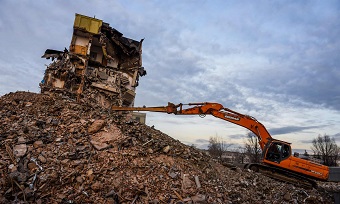 Saturday, April 20, 2024
Saturday, April 20, 2024  Saturday, April 20, 2024
Saturday, April 20, 2024 
The wrecking ball has always been the great symbol of urban progress, going hand in hand with dynamite and dust clouds as the politicians’ favourite way of showing they are getting things done. But what if we stopping knocking things down? What if every existing building had to be preserved, adapted and reused, and new buildings could only use what materials were already available? Could we continue to make and remake our cities out of what is already there?
We might have no choice, given the way our voracious urban consumption habits are going. In the UK, the construction industry accounts for 60% of all materials used, while creating a third of all waste and generating 45% of all CO2 emissions in the process. It is a greedy, profligate and polluting monster, gobbling up resources and spitting out the remains in intractable lumps. On our current course, we are set to triple material extraction in 30 years, and triple waste production by 2100. If we stand any chance of averting climate catastrophe, we must start with buildings – and stop conceiving them in the same way we have for centuries.
This is not just about adding more solar panels, biomass boilers, and all the other bolt-on gadgets to tick the green assessment boxes. It requires a fundamental shift in our attitude to materials.
“We have to think of buildings as material depots,” says Thomas Rau , a Dutch architect who has been working to develop a public database of materials in existing buildings and their potential for reuse. There are now over 2.5m square metres of building matter logged in his Madaster database, and he is currently working with the city of Amsterdam to catalogue the components of every public building in the city. “Waste is simply material without an identity,” he says. “If we track the provenance and performance of every element of a building, giving it an identity, we can eliminate waste.”
He has developed the concept of “material passports”, a digital record of the specific characteristics and value of every material in a construction project, thereby enabling the different parts to be recovered, recycled and reused. His firm recently put the principle into practice with its new headquarters for Triodos, Europe’s leading ethical bank, which he says is the world’s first totally demountable office building. With a structure made entirely from wood, it has been designed with mechanical fixings so that every element can be reused, with all material logged and designed for easy disassembly.
Deadline for this week in Friday at noon